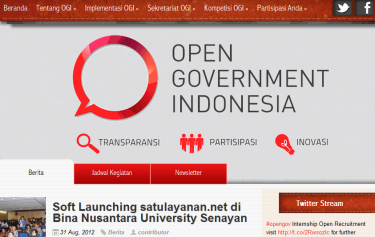Southeast Asian governments have been maximizing their Internet space by establishing various social media profiles, one stop public service portals, and online transparency tools.
We begin the regional tour with Indonesia which recently launched Satu Layanan (One Service) portal. The website provides information and vital public service announcement from 50 government agencies. Iqbal Farabi translates the stated mission of the website:
Satu Layanan is meant to answer the public’s needs of a reliable main reference for people to search for information about government services for their daily needs.
…the portal is not meant to replace each agency’s online service. It simply serves as a pointer to the real service that remains in each respective agency. In the future, Satu Layanan hopes to engage ordinary citizens to contribute as well.
Iqbal mentions that the portal is an initiative of the Open Government Indonesia which was conceptualized to institute reforms in the bureaucracy:
As an Indonesian, I tend to think that most of my government agencies perform terribly when it comes to serving the public. And it is one of the main objectives of Indonesia’s president, Susilo Bambang Yudhoyono, to conduct bureaucratic reform in his now two terms in power. Thanks to the internet, that shake-up is happening right now as some public services – like renewing a drivers’ license – become available online.
According to Iqbal, Open Government Indonesia will develop two more web apps, namely Satu Pemerintah (One Government) and Satu Peta (One Map).
Meanwhile, in neighboring Malaysia, Prime Minister Najib Razak interacts with citizens through the 1Malaysia website:
1Malaysia is intended to provide a free and open forum to discuss the things that matter deeply to us as a Nation. It provides a chance to express and explore the many perspectives of our fellow citizens.
I hope this website will initiate an open and vital dialogue exploring our Malaysian identity, our purpose, and direction.
Malaysia’s government agencies also have active presence in the social media sphere. But a member of parliament questions the use of RM 1.8 million (US$ 578,000) to maintain the Facebook page of the Tourism Ministry:
The Tourism Ministry came under fire again today, as MPs questioned why it had spent RM1.8 million to start and maintain its Facebook page – yet another on the list of controversial projects. Anthony Loke (DAP-Rasah) slammed the decision to use so much money when the social networking site can be used free of charge.
Moving on to Singapore, the Government Social Media Directory highlights the numerous online programs and activities of government ministries:
This online directory is a convenient resource that helps you to search for, discover and read about specific Web 2.0 and other social media initiatives by Singapore government agencies. These include Facebook pages, YouTube channels, Twitter accounts, Flickr photostreams and others.
Cool Insider identifies some of the social media initiatives of the government. The Singapore GovCamp was organized last November to study and promote citizen interaction with the government through the use of technology:
GovCamp Singapore focuses on positioning government as a platform to engage key sectors of a country to come together in one conference and to jointly collaborate on how to improve citizen engagement and services using technology.
Another member of the Open Government Partnership is the Philippines. The government budget portal encourages citizens to submit queries and suggestions:
In line with the Aquino Administration’s thrust of ensuring fiscal transparency, accountability, and citizen engagement, the Citizen’s Portal is an avenue for the public to inquire and engage about the National Budget. Do you have photos and videos of programs and activities in your locality? Submit them by clicking the button below. Make your leaders accountable!
In recent months, the government has been promoting the use of specific hashtags when engaging citizens to join in online conversations about various social issues. For example, #lubak2normal is used to expose bad or unpaved roads in the country. Netizens used #salamatjesse to mourn the death of a beloved government minister. The government announced the use of a so-called ‘unified hashtag’ #walangpasok to monitor suspension of classes during strong rains and typhoons. Recently, #phtrenchquake was used to update the earthquake situation in the southern part of the country.
Elsewhere in East Timor, the government has created the Timor Transparency Portal which provides access to state expenditures and transactions on Budget, Aid, Procurement, and Government Results.
The Government Results Portal is a website that aims to publish outcomes information for the most important government targets, projects and programs. It is part of the government's transparency campaign.
Finally, the Timor-Leste eProcurement Portal aims to enhance transparency and accountability. The website “allows citizens, donors, NGOs and the press to analyze and search information related with the goods, services or works that (the government) is procuring.”








2 comments